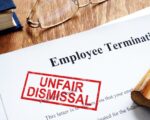
How Companies Can Address Employee Complaints and Grievances?
Addressing Employee complaints and grievances amicably is a skill that all HR personnel need to master while managing the staff of any company. From start-ups to multinational conglomerates, ...

Unfair labour practices by management
No employer or trade union of employers or no person acting on behalf of either shall-
1. Impose any condition in a contract of employment seeking to restrain the right of a person ...

Grievance Handling
A grievance is defined as any real or imagined feeling of personal injustice that an employee has about the employment relations. – William B. Werther and Keith Davis ( 1996).
Grievance ...

Approaches to Industrial Relations
Industrial relations are interpreted from various dimensions. A well founded understanding of these dimensions of industrial relations is benchmark knowledge of human resource managers ...

Unfair labour practices by workers
1. No worker shall remain engaged in any trade union activities during his/her working hour without the permission of the employer.
2. No worker or trade union of workers or no person ...

Functions of Industrial Relations
Industrial Relations are one of the most delicate and complex problems to modern industrial society. It embraces diversified issues into a consolidated manner to deal successfully with ...
Industrial Relation
Employee or industrial relations are the relationships between the state on the one hand and the employers’ and employees’ organizations on the other or are the relationships among ...

Grievance Handling Procedure
Grievance handling procedure is a step-by-step process of presentation of complaints within an organization and ways to resolve them. It can also be seen as a communication process ...

Grievance FAQ
What is a grievance procedure?
When an employee feels that they’ve been wronged – be it an unfair paycheck, an unpleasant assignment, or sexual harassment, they can file a grievance ...

Grievance Procedure
When a complaint is brought to an employer’s attention, the employer usually has a formal way to address the employee’s concerns and try to reach a resolution. Usually this ...
